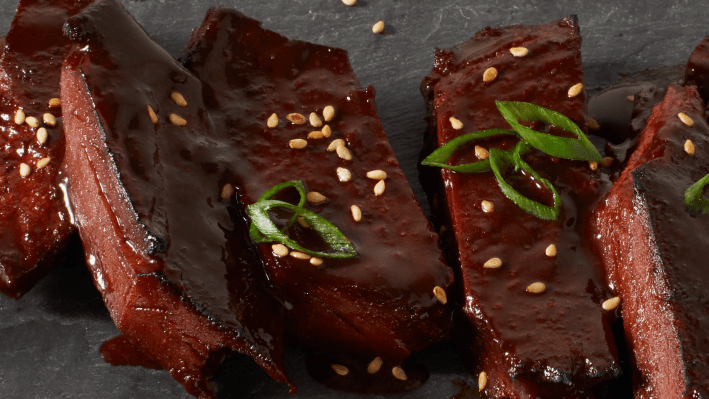Planetarians grabs $6M to get its plant-based protein into foodservice orbit • TechCrunch


A $6 million venture capital infusion is helping Planetarians, a San Francisco–based company creating whole cuts of plant-based protein, move to its next phase of commercial production.
Aleh Manchuliantsau and chef Max Barnthouse founded Planetarians in 2013 as a nutritional drink company. They funded it with a mere $500 and sold 1 million servings, but they were also competing with the likes of Soylent, which had Andreessen Horowitz money behind it, Manchuliantsau told TechCrunch.
“The competition was tough,” he explained. “They started to undercut us trying to eliminate us out of the market using their investment. I started thinking, how can I strike back in a way that cannot be mitigated by another cash injection?”
Looking at the cost of the ingredients the company was using in its drinks, the founders noticed the most expensive item was the protein. By optimizing the cost of the proteins, Manchuliantsau said Planetarians would have “an unfair technological advantage.”
He recalls paying $5,000 for a metric ton of soy protein in those days, and when he asked how much that byproduct costs, he said he was shocked to learn it was just $300.
That started Planetarians’ foray into byproducts, or upcycled ingredients. It started with a sunflower oil cake that it converted into chips. The company sold 100,000 servings, but a problem with texture sent the company back to the drawing board, this time with Barilla, the pasta maker. With Barilla’s flour, it made crackers, which Manchuliantsau said tasted good but yielded a dark color that wasn’t appetizing for pasta.
However, that got the company thinking about where the dark color would not matter and settled on meat. Planetarians elevated its protein content using solid-state fermentation to convert fungi into sugars and started making burger-like patties that it was going to debut when the global pandemic hit in 2020.
That’s when the founders went back to the idea of solid-state fermentation, looking for a way to do that without needing the millions of dollars to build infrastructure.
“I thought, what if we can get the benefits of the fermentation but without fermentation?” Manchuliantsau said. “We analyzed biomass and started looking for what was already available on the market, and we found brewer’s yeast, the byproduct of beer fermentation. They use yeast to ferment sugars, but they need to dispose of it after making the alcohol.”
Planetarians made the first prototypes of its plant-based whole cuts, with an umami-like flavor, using the oil cakes and yeast samples and found that the texture and taste were there. Plus, there are only two ingredients — already with a designation of FDA GRAS (generally recognized as safe) — compared to the dozens of ingredients being used in other plant-based protein products, Manchuliantsau added.

Planetarians co-founders Max Barnthouse and Aleh Manchuliantsau Image Credits: Planetarians
The plant-based alternative protein world has had its ups and downs in the past year. The global market was estimated to be valued at $12.2 billion in 2022 and is poised to grow to around $17 billion in the next five years, driven in part by consumer shift to eating healthier and seeking out more sustainable alternatives to animal proteins.
That said, taste has always been a challenge for plant-based alternatives, among other things, with both Bloomberg and the Washington Post writing recently about whether mainstream adoption of these foods will happen. There’s also been setbacks at some of the industry’s top companies: Beyond Meat’s stock price sank while there were layoffs at Impossible Foods.
Investors remain optimistic about the future of plant-based alternatives, however. For example, Fable Food recently announced $8.5 million in Series A capital for its meat-from-mushrooms approach, while Rebellyous brought in $20 million to rethink the chicken nugget and the ISH Company and New School Foods are experimenting with ingredients for plant-based seafood.
Meanwhile, Planetarians prices its “vegan meat,” its first product being ribs, on par with chicken. It also touts that its carbon footprint is “50x better than animal meat and 9x better than any other plant-based meat,” meaning “eating Planetarians Vegan Meat once a week equals planting 19 trees,” the company said.
The new investment is considered a “Seed II” round, and the company is rolling out its protein, having tested the product with hotels, restaurants and schools, and has secured its first commercial contract.
Mindrock led the investment and was joined by Traction Fund, Techstars, SOSV and AB InBev, which is where Planetarians gets its yeast from. In total, the company raised about $6.7 million.
The company has already verified its technology works at an industrial scale and it has made the first steps on a product market fit. It intends to use the capital to build a pilot facility and continue to ramp up sales. Manchuliantsau said the facility can be as small as 3,000 square feet because it gets the fermented product without having to do that process itself.
“It would cost $3 million to launch the full line that will manufacture up to 15 million pounds per year,” he added.
Next up, the company is preparing its second line and is collecting orders to begin production in October. It is also working with AB InBev to place its lines across every brewery it has around the world.


